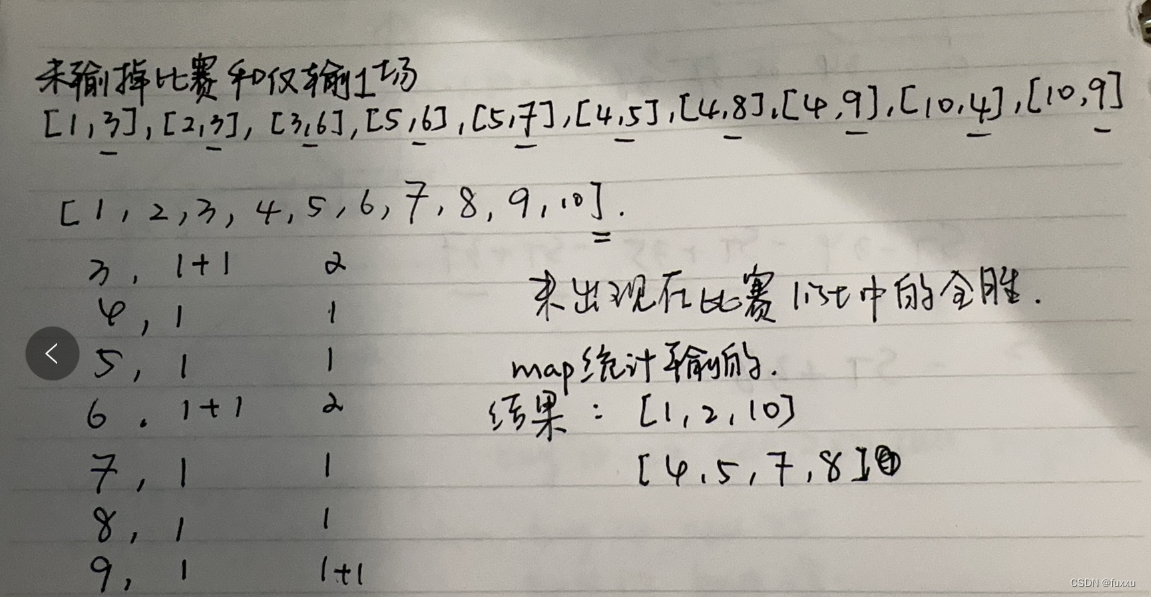20240114-寻找零损失或一损失的玩家
发布时间:2024年01月15日
题目要求
给定一个整数数组 matches,其中 matches[i] = [winneri, Loseri] 表示玩家 Winneri 在一场比赛中击败了玩家 Loseri。
返回大小为 2 的列表答案,其中:
- answer[0] 是所有未输掉任何比赛的玩家的列表。
- answer[1] 是仅输掉一场比赛的所有玩家的列表。
两个列表中的值应按升序返回。
您应该只考虑至少参加过一场比赛的球员。
生成的测试用例不会有任何两个匹配具有相同的结果。
Example 1:
Input: matches = [[1,3],[2,3],[3,6],[5,6],[5,7],[4,5],[4,8],[4,9],[10,4],[10,9]] Output: [[1,2,10],[4,5,7,8]] Explanation: Players 1, 2, and 10 have not lost any matches. Players 4, 5, 7, and 8 each have lost one match. Players 3, 6, and 9 each have lost two matches. Thus, answer[0] = [1,2,10] and answer[1] = [4,5,7,8].
Example 2:
Input: matches = [[2,3],[1,3],[5,4],[6,4]] Output: [[1,2,5,6],[]] Explanation: Players 1, 2, 5, and 6 have not lost any matches. Players 3 and 4 each have lost two matches. Thus, answer[0] = [1,2,5,6] and answer[1] = [].
思路

先把参与比赛的队伍的list得到,然后用哈希表统计输的次数,如果哈希表中的队伍没有出现在全部list中则是全胜的。然后再统计只输一场的即可。
代码
class Solution {
public:
vector<vector<int>> findWinners(vector<vector<int>>& matches) {
vector<vector<int>> res(2);
// 统计不重复的队伍,用到set
set<int> teams;
map<int, int> losses;
for (auto& match : matches) {
teams.insert(match[0]);
teams.insert(match[1]);
losses[match[1]]++;
}
for (int team : teams) {
if (losses.find(team) == losses.end()) {
res[0].push_back(team);
} else if (losses[team] == 1) {
res[1].push_back(team);
}
}
sort(res[0].begin(), res[0].end());
sort(res[1].begin(), res[1].end());
return res;
}
};时间复杂度:
遍历每场比赛的主循环的时间复杂度为 O(N),其中 N 为比赛场次。
查找无失利或正好有一场失利的球队的循环复杂度为 O(T),其中 T 是唯一球队的数量。
对于 res 中的两个子向量,排序功能的复杂度均为 O(T log T)。
总的来说,时间复杂度约为 O(N + T log T)。
空间复杂度:
空间复杂度主要取决于存储团队和失利队伍映射所需的空间。
Map和Set共需要 O(T) 个空间,其中 T 是唯一球队的数量。
结果向量需要额外的空间,但不会超过 O(T)。
因此,总的空间复杂度为 O(T)。
文章来源:https://blog.csdn.net/fuxxu/article/details/135602282
本文来自互联网用户投稿,该文观点仅代表作者本人,不代表本站立场。本站仅提供信息存储空间服务,不拥有所有权,不承担相关法律责任。 如若内容造成侵权/违法违规/事实不符,请联系我的编程经验分享网邮箱:chenni525@qq.com进行投诉反馈,一经查实,立即删除!
本文来自互联网用户投稿,该文观点仅代表作者本人,不代表本站立场。本站仅提供信息存储空间服务,不拥有所有权,不承担相关法律责任。 如若内容造成侵权/违法违规/事实不符,请联系我的编程经验分享网邮箱:chenni525@qq.com进行投诉反馈,一经查实,立即删除!
最新文章
- Python教程
- 深入理解 MySQL 中的 HAVING 关键字和聚合函数
- Qt之QChar编码(1)
- MyBatis入门基础篇
- 用Python脚本实现FFmpeg批量转换
- 数据治理之主数据管理
- 自己动手绕线圈电感详细计算公式
- transforms.Compose()函数作用解析
- 常用文本内容命令(tr cut sort uniq)
- 理解该程序输出,Python精进一步
- 阿里云RDS MySQL 数据如何快速同步到 ClickHouse
- 【Java面试题】ArrayList和LinkedList有什么区别
- Linux系统使用超详细(九)~用户和组管理
- 四、C++运算符(4)比较运算符
- VC++中使用OpenCV对原图像中的四边形区域做透视变换